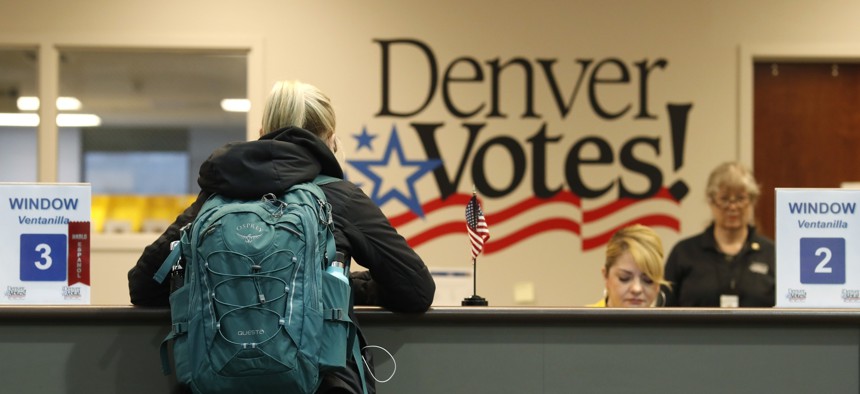Denver Voted to Decriminalize Magic Mushrooms. What Happens Next?

Though mushrooms will still be illegal, the initiative instructs Denver officials to make arrests for the possession or use of psilocybin the “lowest law enforcement priority.” David Zalubowski/AP
The mayor says he’ll respect Initiative 301. The district attorney says it’s open to interpretation. Drug policy experts say officials could ignore it altogether.
When Denver voters approved a measure Tuesday to decriminalize psilocybin, the active ingredient in magic mushrooms, it raised a familiar question: What happens next?
Unconfirmed election results show the ballot initiative, Initiative 301, narrowly passing with 50.5 percent of the vote. Though mushrooms will still be illegal, the initiative instructs city officials to make arrests for the possession or use of psilocybin the “lowest law enforcement priority in the City and County of Denver.”
The move echoes Denver’s 2005 vote to decriminalize cannabis, and once again city officials have to hammer out the details for enforcing new rules that conflict with state and federal drug laws. Psilocybin has been classified as a Schedule I drug for nearly 50 years, and with this first move to challenge that legal status, it’s unclear how the new rules will play out on the ground.
Carolyn Tyler, a spokeswoman for the Denver District Attorney, said the language of the ballot initiative is open-ended, leaving its implementation open to interpretation.
“Reasonable minds may disagree on some points,” Tyler said on Thursday.
The main question is whether the city can still pursue prosecution in psilocybin cases under state law. Because psilocybin possession will still be considered a criminal act in Colorado, drug policy experts say it’s possible that city officials will choose to effectively ignore the ballot initiative and proceed with prosecution.
Denver District Attorney Beth McCann was one of the few politicians to speak out against the ballot initiative before the election. McCann said the state still hadn’t fully analyzed the impacts of legal marijuana, and she cited drugged driving and the attraction of more drug users to the state as possible risks of decriminalizing psilocybin.
Though the ballot initiative only passed by a small margin, psilocybin decriminalization proved more popular than any single candidate in Denver’s crowded mayoral race. With a total of 89,320 votes, Initiative 301 received 20,000 more votes than incumbent mayor Michael Hancock, who now faces a runoff. Regarding the psilocybin initiative, the mayor’s office released a statement Thursday.
“Mayor Hancock respects the decision of the voters and the Denver Police Department will enforce the law accordingly,” the statement read.
Whether or not city officials back off psilocybin prosecution completely, the new rules will do little to change the numbers of people in jail for mushrooms. Between 2016 and 2017, only 11 psilocybin cases were referred for prosecution in Denver. Only three of those cases were pursued, each one targeting a distributor of the drug, rather than a user.
Advocates of reform say Denver’s vote is proof of concept that psilocybin’s legal status can be changed elsewhere.
“This means that this is possible,” said Kevin Matthews, the head of Decriminalize Denver, the campaign responsible for getting Initiative 301 on the ballot. “This is a human movement and it’s possible for the whole country.”
Denver’s clerk and recorder is not expected to certify the election results until May 16, at which point the district attorney’s office will likely release more information about how it plans to interpret the law. In the meantime, Matthews says his campaign will continue to work on building support for psilocybin and to spread the word on the drug’s potential medical uses.
“Almost 50 percent of voters in Denver did not support this, and that’s a really big opportunity for us to get out and start educating people,” Matthews said. “We have a lot of work to do.”
Lindsay Fendt is a freelance journalist and photographer based in Denver.
NEXT STORY: As the Opioid Crisis Peaks, Meth and Cocaine Deaths Explode





